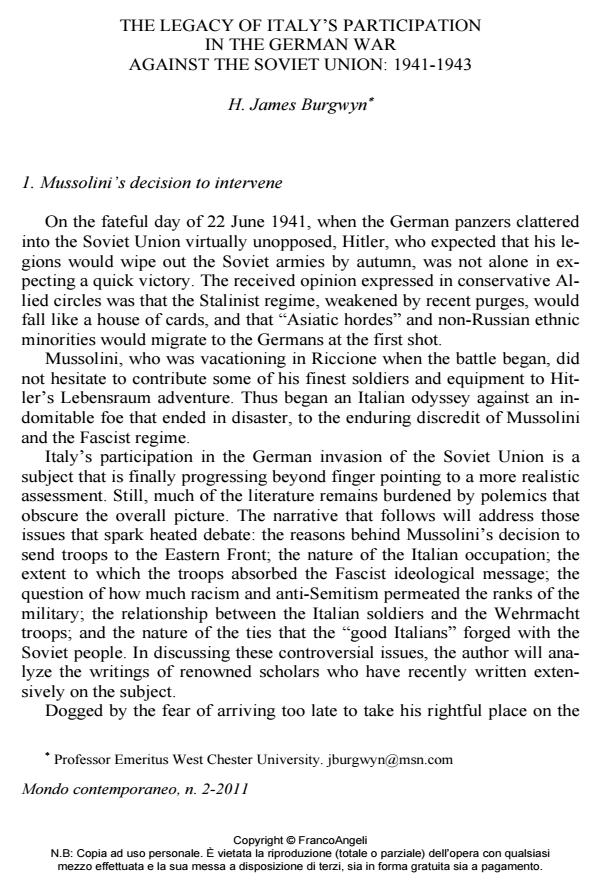The Legacy of Italy’s Participation in the German War Against the Soviet Union: 1941-1943
Titolo Rivista MONDO CONTEMPORANEO
Autori/Curatori H. James Burgwyn
Anno di pubblicazione 2011 Fascicolo 2011/2 Lingua Inglese
Numero pagine 21 P. 161-181 Dimensione file 308 KB
DOI 10.3280/MON2011-002006
Il DOI è il codice a barre della proprietà intellettuale: per saperne di più
clicca qui
Qui sotto puoi vedere in anteprima la prima pagina di questo articolo.
Se questo articolo ti interessa, lo puoi acquistare (e scaricare in formato pdf) seguendo le facili indicazioni per acquistare il download credit. Acquista Download Credits per scaricare questo Articolo in formato PDF

FrancoAngeli è membro della Publishers International Linking Association, Inc (PILA)associazione indipendente e non profit per facilitare (attraverso i servizi tecnologici implementati da CrossRef.org) l’accesso degli studiosi ai contenuti digitali nelle pubblicazioni professionali e scientifiche
The reasons behind Mussolini’s decision to join Hitler in the invasion of the Soviet Union and the subsequent behavior of the Italian troops have sparked lively controversy in the historical literature. In this historiographical essay, the author initially poses the question: was the Duce driven to intervene by sound, or warped, Realpolitik, or by ideological conviction? The author then turns to the nature of the Italian occupation and examines the extent to which Fascist ideology permeated the minds and influenced the conduct of the Italian soldiers fighting along side the Wehrmacht. Did they believe in the Fascist definition of anti-Communist crusade, or were they fighting more out of duty, honor, and country? Next, the author tackles the thorny question of racism and anti-Semitism in the Italian ranks. In his treatment of these questions, the author discusses the important writings of recent historians on the subject. The author then addresses the nature of the relationship between the Italian and German soldiers. Did they, as «good Italians» forge closer ties with Soviet citizens, thanks to a common outlook and experience, than the socalled killer Wehrmacht warriors? Again, the writings of eminent historians who have recently written on these questions are analyzed. In conclusion, the author evaluates Mussolini’s decision to send a large contingent of his military to fight on the Eastern Front.
Le ragioni che stanno dietro la decisione di Mussolini di unirsi a Hitler nell’invasione dell’Unione Sovietica e il successivo comportamento delle truppe italiane hanno suscitato una vivace controversia nella letteratura storiografica. In questo saggio l’autore si pone innanzitutto la domanda: il duce fu spinto a intervenire da motivi di Realpolitik, plausibili o distorti, oppure da convinzioni ideologiche? L’autore prende poi in considerazione la natura dell’occupazione italiana ed esamina in quale misura l’ideologia fascista abbia permeato le menti e influenzato la condotta dei soldati italiani che combattevano accanto alla Wehrmacht. Credevano essi alla definizione fascista di crociata anticomunista o combattevano piuttosto in nome del dovere, dell’onore e della patria? L’autore passa successivamente alla spinosa questione del razzismo e dell’antisemitismo nei ranghi degli italiani e, nel trattare il problema, affronta importanti contributi della recente storiografia in materia. L’autore prende infine in esame la natura delle relazioni tra soldati italiani e tedeschi. È vero che i primi forgiarono, da «italiani brava gente», rapporti più stretti con i civili sovietici, in virtù di vedute ed esperienze comuni, di quanto non fecero i cosiddetti superguerrieri della Wehrmacht? Anche in questo caso vengono esaminati i lavori di storici eminenti che hanno scritto di recente sulla questione. In conclusione, l’autore valuta la decisione di Mussolini di inviare un ampio contingente militare a combattere sul fronte orientale.
Keywords:Decisione di Mussolini per l’intervento, fascismo e truppe italiane, i cosiddetti italiani <i>brava gente</i>, russo amico e tedesco brutale, razzismo e antisemitismo, l’Asse in guerra, l’errata strategia di Mussolini
H. James Burgwyn, The Legacy of Italy’s Participation in the German War Against the Soviet Union: 1941-1943 in "MONDO CONTEMPORANEO" 2/2011, pp 161-181, DOI: 10.3280/MON2011-002006